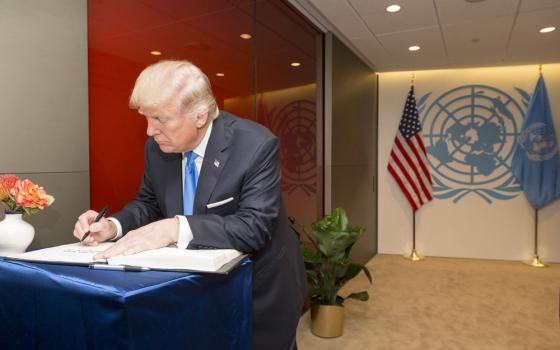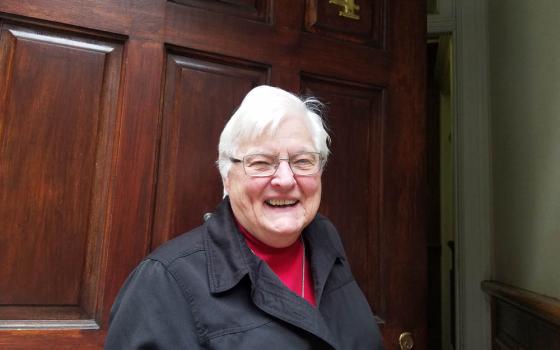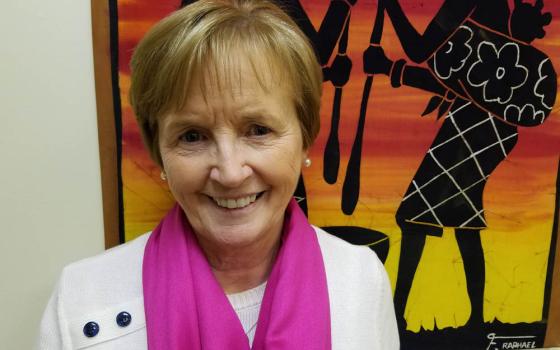If you're an American, you know that wherever you stand politically, the United States is facing deep divisions as a nation — a fact worth pondering today, Presidents Day.
We're aware that our place in the world is shifting. To supporters of President Donald Trump, the affirmation of an "America First" foreign policy is a needed corrective; to the president's critics, the change has put the United States in a strange, unwelcome place.
Covering the United Nations and international issues for Global Sisters Report, I am all too aware of the uncertainty the shift has produced among the sisters who advocate at the U.N. on behalf of their congregations and the people they serve.
Recently, on the heels of Trump's first year in office, I wrote an article on the sisters' frustrations and weariness with the Trump administration. At the core of their anxiety — and it can verge into anger — is the belief that the U.S. government is turning its back on the treasured U.N. values of international cooperation and mutual accountability.
"When national self-interest trumps the common good — well, that's a never-ending dilemma at the United Nations," Sr. Margaret Mayce, an American who represents the Dominican Leadership Conference at the U.N., told me. "But it's in our face now."
Sisters like Mayce are no strangers to being at odds with U.S. government policies — they certainly didn't agree with everything the Obama administration did or said at the U.N. Advocates for a U.N. treaty banning nuclear weapons approved last summer and opposed by the Trump administration told me that the Obama administration would have taken the exact same position.
The U.S. sisters know the United States has always held outsize power and sway at the United Nations, much to the frustration of smaller nations, not to mention U.N.-based colleagues who represent congregations and other nongovernmental organizations from other countries.
That puts Americans like Mayce in a challenging position — having to juggle identities as Americans, women religious, and advocates for peace and justice. Practically, that means having to explain the United States to non-Americans, which inevitably involves moments of defending your country. But it also means being at odds with your government a good share of the time, particularly on issues of war and peace.
But this moment feels different, Mayce told me, in part because the public tone of the Trump administration may be creating unnecessary antagonisms and even enemies for the U.S. (Polling outside the United States points to that, too. As I mentioned last month, Politico reported that global approval of U.S. leadership has dropped to a record low of 30 percent, according to a Gallup poll.)
The changed landscape has created cringe-inducing moments for the American sisters at the U.N., whether it's Trump's comments on Muslims and immigration, the U.S. decision to withdraw from the Paris climate change agreement, or a similar withdrawal from upcoming talks on compacts related to migration and refugees. These positions put the U.S. government squarely against the sisters' advocacy for policies which are pro-immigration, pro-action on climate change and pro-humanitarian.
But it's not only that. At the U.N., where at least on paper the United States is but one country among many, the idea that somehow the United States is not affected by events in the rest of the world — like a go-it-alone position on global migration — strikes Mayce as "extremely risky given the times in which we live."
Positions like that have put Americans like Mayce on the defensive, though maybe that's not necessarily a bad thing, she said.
"It's humbling us," Mayce said of being American right now. "It [is bringing] a level of self-reflection as a nation that we sorely need."
Have the positions of the U.S embarrassed Mayce in her work at the U.N.?
"What I say is that the United States is much bigger than Donald Trump," she said, "and that his values are not our values."
Statements like that aren't just heard at the United Nations. A few miles north of the U.N., in upper Manhattan, is the Holy Name of Jesus Convent. That is home to Sr. Mary Petrosky of the Franciscan Missionaries of Mary. She oversees life at the convent for residents who include sisters from other countries and who, like Mayce, represent their congregations at the U.N.
When I asked Petrosky about her take on the administration and the state of being an American now, especially one who rubs shoulders daily with sisters from other countries, she said: "My preoccupying thought about the U.S. administration at this time is a deep concern that to belong to a political party and be 'successful' — to remain an elected representative — appears to require surrendering one's conscience."
"Is it a necessity in our political world today to surrender one's personal intellectual, philosophical and religious freedom to remain in power?" she asked. "Is an elected official under constraint to follow what the party expects in loyalty or to suffer loss of political or personal gain?"
It is hardly a surprise that a Catholic sister is asking a question about political awareness and conscience at a moment like this. But one newly arrived European sister who works at the U.N. and who visited the U.S. frequently before Trump took office said it's a new America now — one she doesn't always recognize.
"It's like you Americans are apologetic for who you are," said the sister who did not want to be quoted by name for fear of ruffling feathers among her U.S. colleagues. "That's a new experience."
It is also an odd one, said Irish Daughter of Wisdom Sr. Jean Quinn, executive director of UNANIMA International, a United Nations-based coalition of Catholic congregations focused on concerns of women, children, migrants and the environment.
"It is very strange to land in the U.S. now," said Quinn, who is now in her second year as head of UNANIMA. "The atmosphere has changed."
The change, of course, is partly due to the continued "shell shock" of Americans who voted against Trump and are not supporting the president's "America First" agenda. These Americans are engaged in deep soul-reaching about the changed political landscape in the United States and what it means for the country's identity and its place in the world.
Quinn is sympathetic to that questioning and, like Mayce, said this potentially "humbling" moment may be a good thing. As an Irish woman who worked for peace across the border in war-torn Northern Ireland, Quinn knows how dislocating the question of identity can be. She thinks being in a place of vulnerability may benefit the United States in the long term. It may help the country reassess and realign its values, particularly for peace and justice concerns, she said.
"That's a good place to be," she added.
Maybe so, but to American sisters like Petrosky, this is not a comfortable moment.
Citing two Americans whose lives are celebrated in January and February, respectively, she noted that the Rev. Martin Luther King Jr. said that "there comes a time when one must take a position that is neither safe nor politic, nor popular, but must take it because conscience tells him it is right." And the country's first president, George Washington, Petrosky pointed out, famously said, "Labor to keep alive that little spark of celestial fire called conscience."
Petrosky mused about that thought in today's political context. "We are wondering if now the 'little spark' has almost gone out," she said.
On the day Americans honor our presidents, including Washington, let's hope not.
[Chris Herlinger is GSR international correspondent. His email address is [email protected].]




